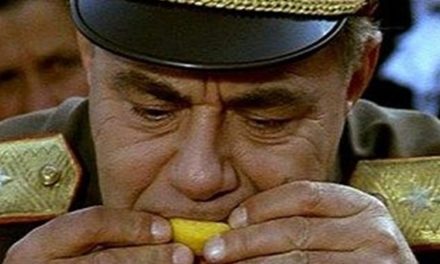The paranoid system looked everywhere, saw enemies everywhere, in everyone, and wanted to free the Hungarian people's democracy from them.
From May 21, 1951 to the middle of July, 5,182 families, a total of 13,670 people from infants to the elderly, were evicted from Budapest. The authority gave them twenty-four hours to pack the most necessary things, liquidate their lives up to that point, say goodbye to their friends and appeal against the deportation decision. The latter had no chance in the first place, the rejection could already be received at the designated forced residence. The order came in the morning, and the following morning the truck, on which they could load the permitted amount of motorcycles, then they waited until evening at the freight station to be loaded into wagons for departure. They were told that they would not stay in Hungary for long, that they would be taken further to Siberia, to the Gulag.
Some of them had already visited the Soviet labor camps, as prisoners of war or as civilians dragged to Malenyky robots. They had experience, but still they could not imagine what could await them. They were class strangers in their own country. Enemies, the enemies of the working Hungarian people. Although they did not understand why they were being branded with this stamp, since they had always served their country. As a military officer, civil servant or even as a representative, even in the multi-party parliament. Among them were former ministers, secretaries of state, judges and prosecutors, officials, former landowners, and descendants of historical families with a long history. Bethlen, Csáky, Esterházy, Széchenyi, Zichy, people whose ancestors or even themselves did so much for Hungary.
According to the final report, the resettlement apparatus worked well and with enthusiasm, and completed its task in two months instead of four, as in the socialist job competition. The party honored the work well done, gave out praise and monetary rewards, and turned a blind eye to the things that disappeared from the sealed apartments. The comrades reserved the high-class apartments for themselves. Not officially, of course, because according to the official version, the confiscated properties were given to the working people. On the other hand, the displaced people never saw their homes and their movables and valuables, which they left behind out of necessity.
The paranoid system looked everywhere, saw enemies everywhere, in everyone, and wanted to free the Hungarian people's democracy from them. Anyone who was not with them, thought differently about the world, or did not sign to support the government's policies was considered an enemy. It was considered an enemy if someone was an educated, wealthy and successful person. They were first declassified, i.e. deprived of their wealth, then of all their historical titles, ranks, and offices. Those who resisted were imprisoned, tortured, and interned.
The system has listed your enemies. There were the B-lists, with which persons deemed politically unreliable were removed from the public sphere. Ninety-three thousand civil servants were placed on the B-list, i.e. on the street. The places of those with legal and economic knowledge were filled with uneducated people.
Suitability meant loyalty to the party and people's democracy. Graduated professionals could count themselves lucky if they were hired as a helper, warehouse worker, or laundry worker. The state of the working people withdrew pensions from the elderly, and they too had to go to work. The 1949 Constitution of the Hungarian People's Republic (which many would still adhere to), in an effort to implement the principle of socialism, valued everyone according to their ability and work.
There were kulak lists. "Every communist child knows that kulaks are a political category," wrote the iconic figure of the era, Comrade Rákosi. The village "exploiters", i.e. the well-mannered - or rather hardworking - peasant farmers, were added to the list of kulaks. About one hundred thousand peasant farms were added to the list of kulaks. Their lands were taken, their loans were canceled, they were removed from the boards of traditional farmer cooperatives, and they were hit with a lump sum tax and a duty to pay taxes. The liquidation of the kulaks began, popularly known as the period of attic sweeping. Many people gave up, but many kulak families were displaced. The countryside also had to be kept in fear.
Unreliable elements deemed still dangerous for the system were eventually deported. We dare to say that in terms of means and goals, the placement in forced housing was similar to the deportation of the Jews! The property was taken away, without a court verdict, the people deprived of their rights and intimidated were transported by official force. The police and ÁVH officers participating in the deportation were no different from the cadets. The social stratum branded as fascist, horthyist, exploiter, ruling class was condemned to slow destruction, the ultimate goal was their physical destruction.
I read the reminiscences of former displaced persons. I see the three-year-old girl who doesn't understand what's going on at two in the morning, clutching her baby and sobbing that she's not going anywhere. A rude man knocks her to the ground so that she only squeals. I see the crying eight-year-old girl walking twenty kilometers from the farm to the village school every day, in the snow and mud, in the dark, with fear in her heart. No one was allowed to accompany him, because the parents were not allowed to leave the boundaries of the farm and had to work anyway for a modest daily income.
I see the teenager who reads the Egri stars to rags, because this was the book he could take with him. I see teenagers doing hard physical work who, no matter how much they wanted to, couldn't study further because the stigma "X" (class alien) was next to their name. What kind of psychological injuries could this have left in them? How could a small child displaced with his parents be considered a class enemy?
How Countess Margit Bethlen, the wife of former prime minister István Bethlen, who was dragged to the Soviet Union, survived the displacement. At the age of sixty-nine, she was assigned a ten-square-meter earthen chamber of a kulak as forced housing. Why was he considered dangerous, an enemy of the people?
What was it like for the internees to live with their families in the barrack camp in Hortobágy, in apartments converted from pig sties and sheepfolds, behind barbed wire? Working for pennies from dawn to dusk, because there was no other source of income, and the displaced people were paid less for the same work. How was it possible to endure the daily humiliation, mental and physical terror? What was the feeling of powerlessness and vulnerability trapped in a fist? What could keep the spirit in these people? Perhaps it is the consciousness of their innocence, the strong faith in God, the remaining dignity and the inalienable knowledge.
And how did those who assisted in these illegalities on orders and instructions of the party feel? How did you feel then and how did you explain it later? How could they deal with their conscience?
The amnesty decree that followed Stalin's death brought relief and release. This did not mean that the displaced could return to their homes. Claims for recovery and claims for compensation were rejected in all cases. They could not even set foot in Budapest, nor in the larger cities or the border strip. They did not have their own apartment, their material possessions were taken away, and they could only apply for manual labor. The X was still there next to their children's names, and only those who persevered could obtain a high school diploma or diploma in the evening section. The many rejections were the same level of humiliation as the misery of displacement.
At the time of the amnesty order, the party re-listed class aliens. In 1953, there were 94,827 of them. The state security officials registered much more enemies than this, about two million people. Forty thousand agents were assigned to them. The list of anti-regime people was used by the secret services until the regime change.
There is little talk about these times these days, there is a lot of chaos in people's minds. The attempt to transform society in the Soviet manner, i.e. the transfer of communist ideology into practice, ran into a dead end, but the ideological brainwashing was successful. Would it be worthwhile to conduct a survey, broken down by generation, to see what people know about this world when, at least according to paper, the working class built socialism hand in hand with its allied peasantry? What do they know about how the Muscovite party elite used uneducated, ordinary people to build their dictatorship?
What do they know about the fact that the party, for the sake of its power, mercilessly removed from the road everyone it considered an enemy of the communist system to be implemented.
A non-disclosure agreement was signed with the displaced persons. Whoever violated it, gossiped, violated the state secret, and this entailed severe punishment. So those involved did not speak, and after forty years there were few who could speak. The documents have been searchable since 1995, but the really incriminating papers have disappeared from the archives. The majority of society does not remember or does not want to remember the cruelties of the 1950s, the lynchings due to involvement. The descendants of the responsible communist party elite live carefree among us, as do the descendants of those who served this corrupt, lawless system.
Revenge is absent from those who have innocently walked through the pits of hell. Somehow everyone has come to terms with their fate. They had to live, work, study, and show that they had the strength even under such conditions. They came to terms with their fate, but did not forgive. Because what they did to them cannot be forgiven.
Source: Magyar Hírlap
Picture: Róbert Hegedűs












